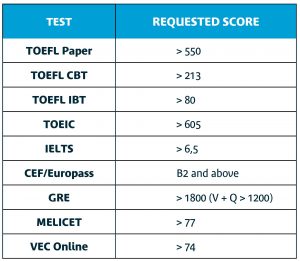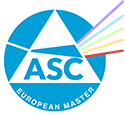Frequently asked questions
About ASC
MASTER PROGRAMME ORGANIZATION
ASC Master Course is a two-year (4 semesters) progamme. Each semester (30 credits) must be completed to obtain ASC Master Diploma.
The third semester comprehends theoretical courses (20 credits) and a Project Case Study (10 credits).
The fourth semester is dedicated to the research project & master thesis (30 credits).
The Project Case Study and Master Thesis can be linked (same lab, same topic).
For details, please click here.
Students need to arrive in Lille at the end of August when welcome events take place. The scientific classes begin in the first week of September in the University of Lille.
YES, in all ASC partner institutions.
NO, you will attend an intensive French course (“survival kit”) upon arrival in Lille, and you will have to decide if you wish to pursue with an extensive course during the first year (both free of charge).
Each ASC institution will provide the same kind of opportunity, in their own national language, not necessarily organized in the same way.
WHAT ABOUT MOBILITY?
The ASC Master’s course is a joint Master’s programme. Mobility is therefore a mandatory component of the programme, and one of its features of interest.
When chosing the universities of the Consortium where you wish to study, please bear in mind the following:
- Within the ASC Master, students must study in at least 2 different universities of the Consortium.
- Your choice must be based on your own scientific preferences and specific topics offered at each university.
- Please see the ASC Master mobility scheme
- Think about the location where you wish to do your Master Thesis. Namely if you wish to do it in Lille: you should then make sure you spend the second and/or third semester at another institution.
- Check the academic calendars: they vary at each place. Make sure there will be no overlapping.
- Instruction language is English at all Universities.
You will have the opportunity to meet the ASC coordinators of the partner universities in Lille shortly after your arrival, in October. They will present their institutions and specificities to help you confirm/make your choice.
Information about the academic calendar, housing, laboratories… can be found here.
WHAT ARE THE FUNDING OPPORTUNITIES ?
There are two types of Erasmus Mundus scholarships:
- Scholarships for Programme country students
- Scholarships for Partner country students
- Both Programme Country students and Partner Country students are eligible for EMJMD scholarships (see Erasmus + programme guide)
- The student candidate / scholarship holder commits to not benefit from another EU funded scholarship scheme to follow the same EMJMD course for the entire period of the course.
- The student candidate / scholarship holder declares to not have already benefited from a previous EMJMD scholarship or an Erasmus Mundus Master Course/Joint Doctorate scholarship.
Programme country students with an EMJMD scholarship are not allowed to benefit from the scholarship when they are in their country of residence for either study, research, placement or thesis preparation. - To be eligible, candidates must complete mobility in a minimum of 2 HEIs in programme countries (other than his own country of residence).
- There cannot be more than three nationals from the same country among the scholarship holders for a given category of students (Programme/Partner Country).
The financial support shall be repaid by the scholarship holder in case of fraud or false declaration.
All of the countries below are considered Programme Countries:
Austria, Belgium, Bulgaria, Croatia, Cyprus, Czech Republic, Denmark, Estonia, Finland, France, Germany, Greece, Hungary, Iceland, Ireland, Italy, Latvia, Liechtenstein, Lithuania, Luxembourg, Malta, Netherlands, North Macedonia, Norway, Poland, Portugal, Romania, Serbia, Slovakia, Slovenia, Spain, Sweden, Turkey, United-Kingdom.
Any country that is not on this list is considered a Partner Country.
Partner country students who are residents and have carried out their main activity (studies, training or work) for more than a total of 12 months over the last five years in a Programme Country are considered as programme country students. The five-year reference period for this 12-month rule is calculated backwards as from the ASC application submission deadline.
For students who are selected without an EM scholarship:
Erasmus+ mobility grants are available for each mobility period. Region Hauts de France offers mobility scholarships on a regular basis for the second year of the master spent in any of the consortium’s institutions. Students spending the second year of the programme in the University of Bologna can apply for the « Toso Montanari » scholarship.
Click here for details
Tuition fee waivers are possible on the basis of academic excellence and social needs.
HOW TO APPLY?
Pre-requisite level: Eurobachelor in Chemistry or equivalent degree (BSc in CHemistry, Physics, Biochemistry).
Students with a BSc in Pharmacy have enrolled and successfully completed the ASC master’s course in the past, although they may have had to catch up in some fields of chemistry.
The selection board carefully screens the academic background of each applicant (content and level) to ensure all selected students will have all chances of success.
Students from all over the world are welcome into our European programme.
For details, please click here.
Students who have not yet obtained their first degree may be admitted conditionally to the ASC Master’s Course and selected conditionally for scholarships, on the basis that the admission and the scholarships only become effective if the students obtain their first degree before the start of the Master’s Course.
If you are still a student at the time of application and/or haven’t received your diploma yet, you can provide us with a certificate of enrollment from your University, attesting that you have completed (or are on your way to complete) your diploma/degree. The letter has to specify your name, the type of degree/diploma and the month in which you are expected to graduate.
Courses are taught in English. All students need to have a good knowledge of English (B2 level or equivalent to 580 TOEFL score). If you don’t hold any English language certification when filing your application, please proceed to your self-assessment by creating your own Europass Language Passport
If English is the medium of instruction in your university, then an official certificate stating this, issued by an officer of your university will be accepted instead of IELTS or Toefl.
All students will be tested upon arrival before starting the language classes.
For your information, here are the main tests and requested scores:

You have to provide a recent residence certificate issued in accordance with your municipality normal registration rules OR a recent certificate from your place of work, study or training, issued by the employer or institution in question. Documents must have been issued within 12 months before the submission deadline.
The purpose of the residence certificate is to prove you current postal address. Therefore, your name and your own address need to appear on the document.
Documents such as birth certificate, passport, ID card, driving licence, etc. will not be accepted.
There is no specific format. The letters, in English, need to be on official letterheads, signed and stamped and show the full contact details and position of the referee.
Content: the referees will evaluate the candidate’s suitability for the “Advanced Spectroscopy in Chemistry” Master’s program. The candidate should have already fully briefed the referee about the programme.
An electronic version of the recommendation letters will be uploaded by the applicant or sent to us by the referee.
A valid passport is required for application (Or ID card for EU citizens). A proof of renewal can be accepted.
If you do not hold a passport yet at application stage, please enter “no passport” in the relevant field while applying on-line. In this case you will provide a copy of your national identity card as proof of your identity at application stage.
But note that admission into ASC Master Course can only be granted if you send us a copy of your passport within two weeks of the selection notice.
Non-EU students must also be aware that in case they are admitted to the program, they will need to quickly start their visa application (an average of 2 to 3 months is necessary to get a visa), and a valid passport will of course be requested to file the visa application. Check expiry dates!
The official visa website for France: government’s website
Your application is valid only for the current call, even if you are selected and cannot attend: you will have to apply again for the next call.
You need to repeat your online application
